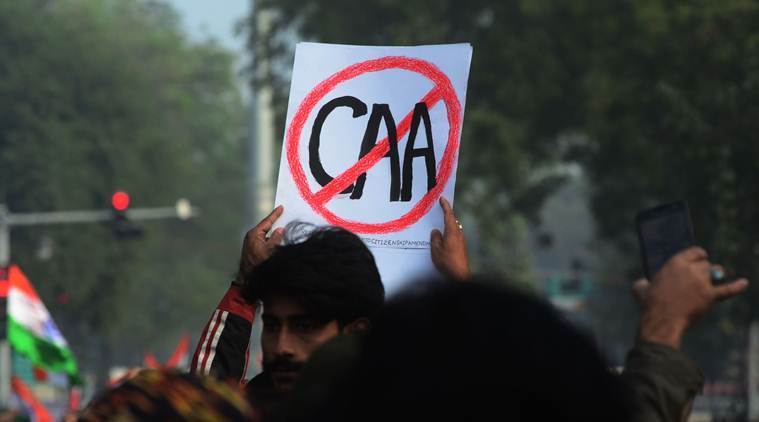 The Urdu Times on March 1 has an editorial which cites an RTI application about PM Modi’s citizenship.
The Urdu Times on March 1 has an editorial which cites an RTI application about PM Modi’s citizenship.
The trinity of CAA-NPR-NRC continues to elicit strong editorial response. Munsif’s editorial on March 5 has a question as its title: “Is this also a trick by the Opposition?” It speaks of the US’s Freedom of Religion Commission and points out that “many countries have criticised the laws that discriminate against the Muslims” It also says that “many countries have expressed concern over the violence in Delhi, the latest being Iran against whom the Indian government has hit out”. The paper speaks of the UN Human Rights Commissioner’s statement and talks of the possibility of India attracting similar criticism from other quarters.
The Urdu Times on March 1 has an editorial which cites an RTI application about PM Modi’s citizenship. According to the paper, “The PMO has made it clear that the PM has no proof of his citizenship because he is a citizen by birth as per Section 3 of the Citizenship Act 1955.” The editorial says that Amit Shah accuses the Opposition of fomenting trouble, but asks if “Indians are so foolish as to get instigated on giving up peace (sukoon) and protest on the streets for months?” The editorial concludes by saying “it is the duty of each citizen to save the Constitution”.
Siasat on March 1 speaks of “No NPR in Telangana”. The paper’s editorial says that the CAA-NPR-NRC “have created a sense of restlessness.. protests against the law by a section of people should be a cause for concern. But PM Modi has done nothing to assure people and reduce the climate of hate.” The paper believes that “the SC should have either struck this law down or stayed it but it has given the Centre respite by asking for a ‘reply’..if the Court plays by the Constitution, there is a possibility of people getting some respite.”
US-Taliban detente
Avadhnama’s editorial on March 3 on the US-Taliban pact describes the agreement as a sign of “new hope.” It says that “permanent peace is in the region would be a blessing for its people and for a country which for so long has been full of violence.” It also avers that the peace in Afghanistan would be a blessing for India, which is involved in several developmental projects in the region.
Munsif’s editorial on March 3 says it is now “incumbent on the people of Afghanistan to arrive at an agreement over how the country is governed.the main players in the country must resolve their differences. Otherwise, the country would be the biggest loser.” It contends that the next fortnight will be very important “because there will be discussions on the constitution of Afghanistan.”
Delhi violence
Inquilab on February 29 has a strong editorial: ‘Gujarat model or the Delhi model?’ It says “life has started coming back on the tracks in Delhi”. But the wounds inflicted by three days of horror will take time to heal. It is good that the LG appears interested in restoring peace and amity. This is something the administration should have done earlier.” The paper criticises the Union home minister for not visiting the violence-hit place. “No riot can last beyond 24 hours, if the police and the administration don’t want it to,” the editorial contends. The paper has another editorial on March 10 asking for “an impartial inquiry into the Delhi riots.”
Etemaad’s editorial on March 2 is titled, “In the name of peace, rousing violence”. The editorial points out that “not just Kapil Mishra but many other leaders of the BJP have issued inflammatory statements against peaceful protestors. These include Union minister Anurag Thakur and the UP Chief Minister Yogi Adityanath.” The editorial points out that “after more than 40 people died in the riots, Mishra, in the name of a ‘peace march’, made another bid to damage peace. He took out a march in which cries of ‘goli maaron’ could be clearly heard.”
Munsif’s editorial on March 4 asks, “Why double standards?” It speaks of the “best way to install confidence” amongst those who were attacked and lost their houses “would be to take action against those responsible, build a strong case against them and ensure that they are punished. But it is sad that instead the police is protecting those elements”. The world knows how the BJP leaders, Kapil Mishra, Anurag Thakur, Parvesh Sahib Singh Verma, vitiated the atmosphere during the Delhi Assembly elections.there is information that the police has increased the security of Kapil Mishra. What is the message that is being given to Delhi?” The paper writes that while it is good that action is being taken against the AAP MLA, “why has there no action against the BJP leaders?” There is no need to look for proof against them either, as videos of their hate-filled speeches are in the public domain..but the Delhi police is trying to project them as heroes, a condemnable act.” —Compiled by Seema Chishti